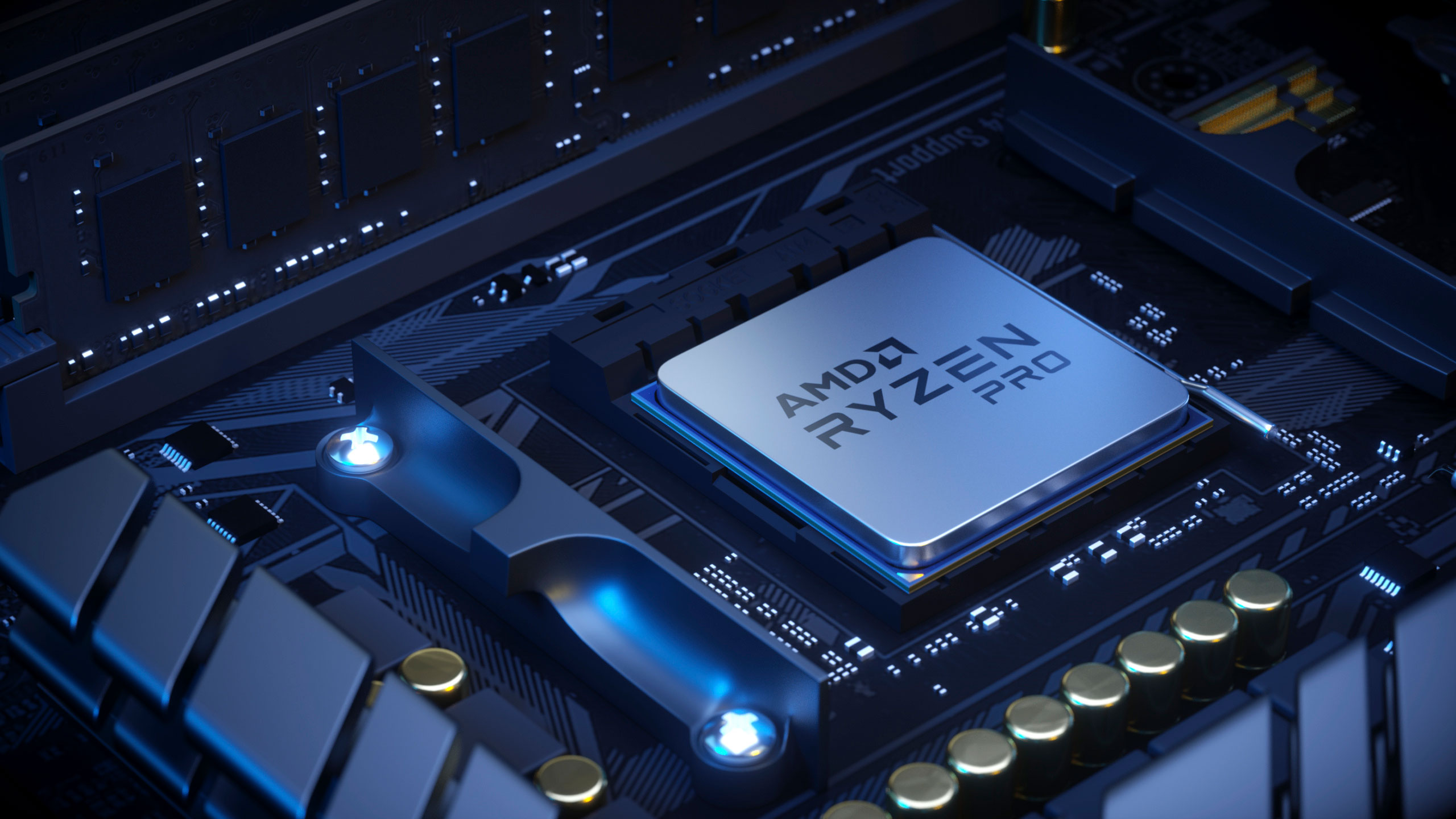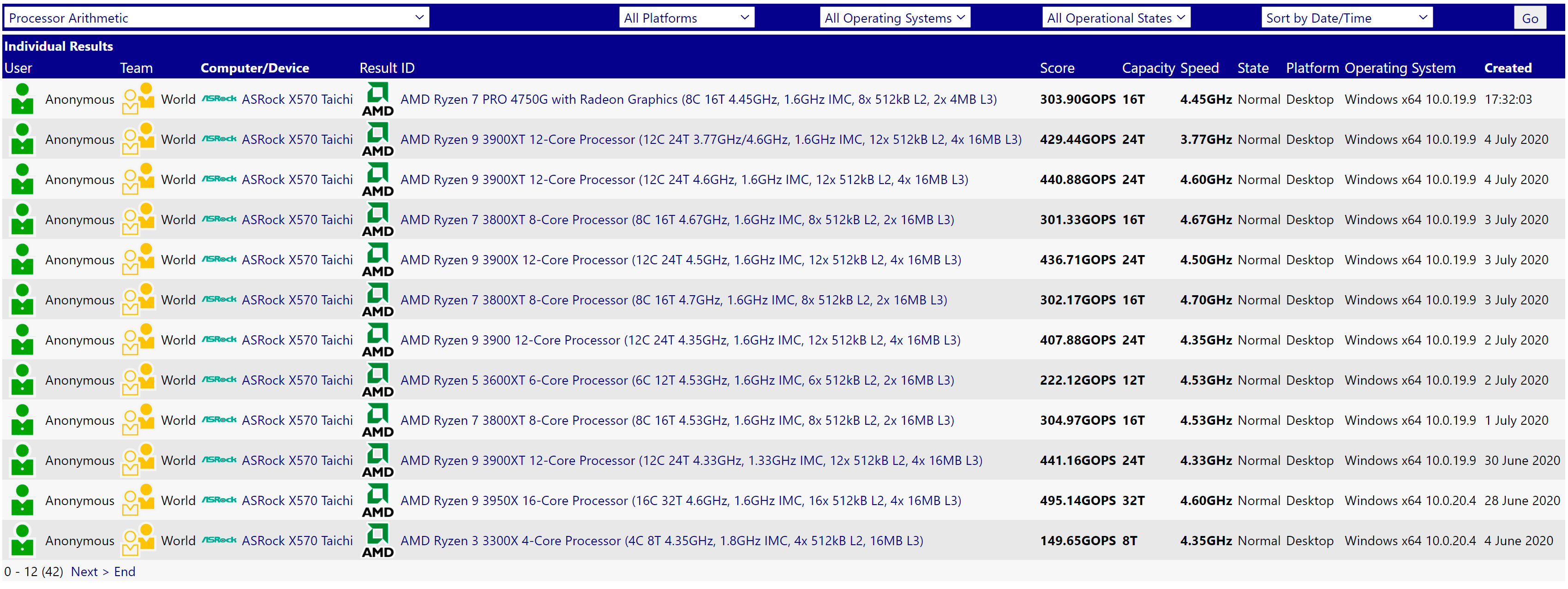Ryzen 7 Pro 4750G Allegedly Shows Similar Performance As Ryzen 7 3800XT

AMD's APUs might not get a lot of attention unlike the chipmaker's mainstream processors. However, desktop Renoir begs to differ. According to one particular SiSoftware benchmark (via @TUM_APISAK), the Ryzen 7 Pro 4750G's performance is in the same ballpark as the Ryzen 7 3800XT that recently came out of AMD's oven.
For starters, both Ryzen processors are cut from the same cloth. They feature AMD's Zen 2 microarchitecture and are a product of TSMC's 7nm FinFET process node. They are equipped with eight cores and 16 threads, but with a different clock speeds and cache capacity.
The Ryzen 7 3800XT (codenamed Matisse) flexes 32MB of L3 cache, a 3.9 GHz base clock and a 4.7 GHz boost clock. The exact specifications for the Ryzen 7 Pro 4750G are unknown at this time. Nonetheless, a retailer listing paints the octa-core APU with 8MB of L3 cache, a 3.7 GHz base clock and 4.4 GHz boost clock. Of course, the Ryzen 7 Pro 4750G comes with a Vega iGPU in addition to a 40W lower TDP (thermal design power) rating.
Although ingredients for the Ryzen 7 Pro 4750G and Ryzen 7 3800XT are comparable, the recipe is different. The first utilizes a monolithic die, while the latter leverages a chiplet design with different dies that are bound together to an I/O die via AMD's Infinity Fabric interconnect.
| Model | Cores / Threads | Base / Boost Clock (GHz) | L2 / L3 Cache (MB) | Compute Units | Graphics Frequency (MHz) | TDP (W) |
|---|---|---|---|---|---|---|
| Ryzen 7 3800XT | 8 / 16 | 3.9 / 4.7 | 4 / 32 | N/A | N/A | 105 |
| Ryzen 7 Pro 4750G* | 8 / 16 | 3.7 / 4.4 | 4 / 8 | 8 | 2,100 | 65 |
*Specifications are unconfirmed.
The Ryzen 7 Pro 4750G puts up a Processor Arithmetic score of 303.90 GOPS, while the Ryzen 7 3800XT's scores vary between 301.33 and 304.97 GOPS. It might come as a surprise that the results are so close together given that the Ryzen 7 3800XT has a higher boost clock and more thermal headroom in comparison to the Renoir APU. Regardless, there's a possible explanation.
On the Ryzen 7 3800XT, the chiplets interact with each other through the Infinity Fabric, which poses as a highway for communication and, as a result, adds latency. With a traditional monolithic design, everything is on the die. While latency is still present, the performance penalty is lower than that of a chiplet design.
Get Tom's Hardware's best news and in-depth reviews, straight to your inbox.
A monolithic design should allow the Ryzen 7 Pro 4750G to shine in certain scenarios, but it's naive to think that the APU will beat the Ryzen 7 3800XT in every other workload. At any rate, it would require a full evaluation to determine just how close the Ryzen 7 Pro 4750G or the mainstream Ryzen 7 4700G can get to the Ryzen 7 3800XT.
If the octa-core APU can get even within 10% to 15% of the Ryzen 7 3800XT, it would be a win. Renoir never aimed to replace Matisse in the first place. It represents an accessible ticket for budget hunters to get exploit Zen 2's prowess with the benefits of integrated graphics.
Centralpoint, a Dutch retailer, claims that it will have Renoir stock by July 17. If the shop's information is genuine, then desktop Renoir's launch should be right around the corner.

Zhiye Liu is a news editor, memory reviewer, and SSD tester at Tom’s Hardware. Although he loves everything that’s hardware, he has a soft spot for CPUs, GPUs, and RAM.
-
InvalidError It wouldn't surprise me at all that 8c16t Zen 2 APUs beat similarly clocked CPUs thanks to the much lower CPU-memory latency of a monolithic design despite having only a fraction as much cache - hiding chiplets' latency penalty is the main reason behind Zen 2's large L3 cache in the first place.Reply -
Darkbreeze Why is this:Reply
The Ryzen 7 3700XT (codenamed Matisse) flexes 32MB of L3 cache, a 3.9 GHz base clock and a 4.7 GHz boost clock.
Even part of the article, when before that sentence was this:
the Ryzen 7 Pro 4750G's performance is in the same ballpark as the Ryzen 7 3800XT that recently came out of AMD's oven.
And after it was this:
The Ryzen 7 Pro 4750G puts up a Processor Arithmetic score of 303.90 GOPS, while the Ryzen 7 3800XT's scores vary between 301.33 and 304.97 GOPS. It might come as a surprise that the results are so close together given that the Ryzen 7 3800XT has a higher boost clock and more thermal headroom in comparison to the Renoir APU. Regardless, there's a possible explanation.
On the Ryzen 7 3800XT, the chiplets interact with each other.................
Seems like references to the 3700xt have no place in the context of this article. Typo?
